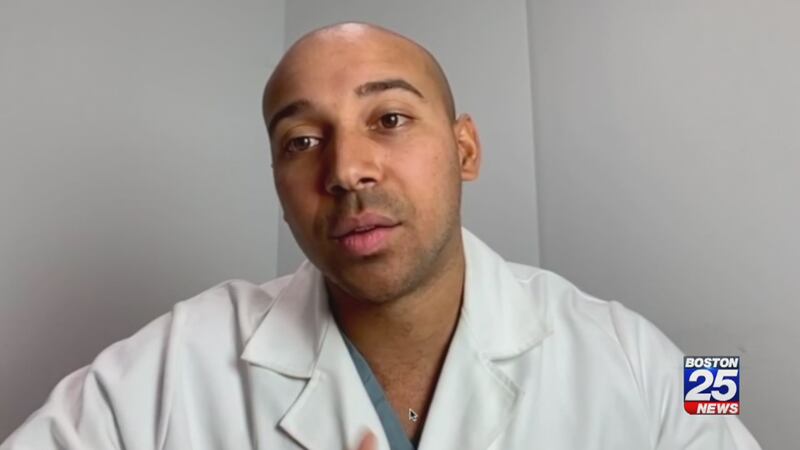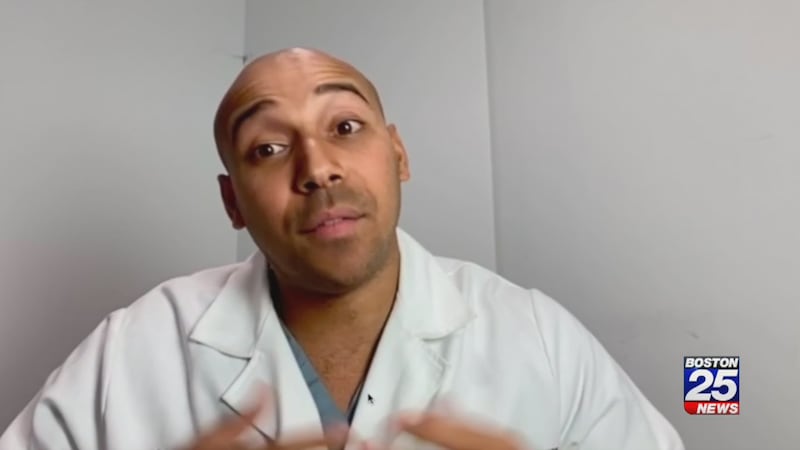BOSTON — Dr. Alister Martin, an emergency room physican at Massachusetts General Hospital, described how COVID-19 led to an unprecedented shift for him.
“We had one person who came in and needed to be put on a ventilator and as we were beginning that process, we had another person come in and we’d need to stabilize that person and as soon as we were ready to go to the intubation on the first person, we had a third person come in,” Martin recalled of his shift Tuesday.
11 patients placed on ventilators in one day shift. There’s still one hour left. Unprecedented. The curve is not flat. Please stay home, Boston. #COVID19 pic.twitter.com/O371M6GKx1
— Alister Martin (@AlisterFMartin) March 31, 2020
During Martin’s shift, 12 patients with COVID-19 symptoms arrived at the emergency room so ill, they needed to be placed on ventilators. Martin said he’s seeing a spike in the acuity of patients with coronavirus. He hopes Tuesday’s shift was just a fluke, but he fears it could be a warning of what’s to come.
“What’s been very interesting is the patients who came in with pretty advanced symptoms of COVID, a lot of them tried at home to do self isolate, quarantine, keep themselves hydrated and eventually they, as we say in medicine, fell off the curve,” Martin said.
As local hospitals prepared for an expected surge in coronavirus cases, they’re worried about the critical shortage of personal protective equipment.
“It’s to the point now where physicians are scared,” Martin said. “We’re scared for their own lives in ways we have never been before.”
Martin said healthcare professionals shouldn't be bootstrapping donation drives for personal protective equipment.
“There should be a supply chain backup,” Martin said. “Why is it that we have to have doctors create websites asking people to donate their spray-paint masks? That’s unheard of.”
Martin said local hospitals are currently able to manage the number of patients they’re seeing, but he warns they could soon become overwhelmed if people don’t take social distancing seriously.
“You know what the best variable is to determine whether or not we need a field hospital,” Martin asked. “How successful we were at staying home and doing the social distancing.”
Martin admits social distancing is a challenge. He said he and his colleagues in the emergency room are also feeling the impacts.
“It’s really hard to not go out, hang out with your friends and grab a drink after a shift,” Martin said. “I know. Our ER, the way that we bond, is after a hard shift, we go out, grab a burger and a beer and debrief. We can’t do that. It really is difficult for all of us.”
Martin said while the current pandemic is what they train for, the effect it has on them and their families can be grueling.
“I’ve had shifts with some of my colleagues who work their tales off through a shift, had a potential exposure and then had to make the decision - do I go home tonight or do I get a hotel room,” Martin said. “Those are really, really hard decisions because after a hard day, you need the support of people who love you and your friends and family and to go into an isolation scenario is not healthy.”
Martin said if people do their part, we can keep the number of cases down and avoid what’s happening in New York where a shortage of ventilators has forced doctors to decide which patient gets one and which doesn’t.
“Those are decisions that you never want to have to make," Martin said.
Martin also wants to make sure hospital facilities and maintenance teams are being recognized as well. He said at MGH, he’s mind blown at how quickly they’re able to clean, disinfect and turnaround life-saving equipment so patients never have delays.
Huge shout out to our unsung heroes in this fight including Michael + the rest of the @MassGeneralEM facilities + maintenance team. How they are able to so quickly clean, disinfect, and turnaround the lifesaving equip we need so patients never have delays I will never know! pic.twitter.com/ivJjNgWQR2
— Alister Martin (@AlisterFMartin) April 1, 2020
Martin said his message to Boston is stay home, but stay hopeful. He added while this is a crisis, there’s an opportunity to reinvest in public health. He said advancements in diagnostics and treatments while help us prevent future pandemic situations.
© 2020 Cox Media Group









